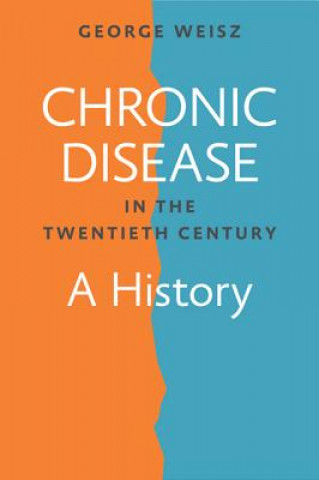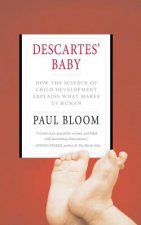
Kód: 04791874
Chronic Disease in the Twentieth Century
Autor George Weisz
Long and recurring illnesses have burdened sick people and their doctors since ancient times, but until recently the concept of "chronic disease" had limited significance. Even lingering diseases like tuberculosis, a leading cause ... celý popis
- Jazyk:
 Angličtina
Angličtina - Väzba: Pevná
- Počet strán: 328
Nakladateľ: Johns Hopkins University Press, 2014
- Viac informácií o knihe

78.56 €

Skladom u dodávateľa v malom množstve
Odosielame za 10 - 14 dní
Potrebujete viac kusov?Ak máte záujem o viac kusov, preverte, prosím, najprv dostupnosť titulu na našej zákazníckej podpore.
Pridať medzi želanie
Mohlo by sa vám tiež páčiť
-

South and America since World War II
37 € -

Ukraine, 1917-21
15.26 € -3 % -

Geostatistics for Natural Resources Evaluation
242.98 € -

Man Crazy
11.72 € -

Modern Utopian
20.11 € -4 % -

Descartes' Baby
31.74 € -

Prime-Time Families
45.19 € -

Cost of a Military Person-year
25.37 € -

101 Ground Training Exercises for Every Horse and Handler
24.46 € -21 % -

Thyroid Disease in Clinical Practice
137.81 € -

Apeetha
30.63 € -

Customer Satisfaction and Service Loyalty in Banking Industry
62.89 € -

Canadian Yearbook of International Law, Vol. 44, 2006
223.16 € -

BORN TO DIE SSA
8.89 € -13 %
Darčekový poukaz: Radosť zaručená
- Darujte poukaz v ľubovoľnej hodnote, a my sa postaráme o zvyšok.
- Poukaz sa vzťahuje na všetky produkty v našej ponuke.
- Elektronický poukaz si vytlačíte z e-mailu a môžete ho ihneď darovať.
- Platnosť poukazu je 12 mesiacov od dátumu vystavenia.
Viac informácií o knihe Chronic Disease in the Twentieth Century
Nákupom získate 197 bodov
 Anotácia knihy
Anotácia knihy
Long and recurring illnesses have burdened sick people and their doctors since ancient times, but until recently the concept of "chronic disease" had limited significance. Even lingering diseases like tuberculosis, a leading cause of mortality, did not inspire dedicated public health activities until the later decades of the nineteenth century, when it became understood as a treatable infectious disease. Historian of medicine George Weisz analyzes why the idea of chronic disease assumed critical importance in the twentieth century and how it acquired new meaning as one of the most serious problems facing national healthcare systems. Chronic Disease in the Twentieth Century challenges the conventional wisdom that the concept of chronic disease emerged because medicine's ability to cure infectious disease led to changing patterns of disease. Instead, it suggests, the concept was constructed and has evolved to serve a variety of political and social purposes. How and why the concept developed differently in the United States, the United Kingdom, and France are central concerns of this work. In the United States, anxiety about chronic disease spread early in the twentieth century and was transformed in the 1950s and 1960s into a national crisis that helped shape healthcare reform. In the United Kingdom, the concept emerged only after World War II, was associated almost exclusively with proper medical care for the elderly population, and became closely linked to the development of geriatrics as a specialty. In France, the problems of elderly and infirm people were handled as technical and administrative matters until the 1950s and 1960s, when medical treatment of elderly people emerged as a subset of their wider social marginality. While an international consensus now exists regarding a chronic disease crisis that demands better forms of disease management, the different paths taken by these countries during the twentieth century continue to exert profound influence. This book seeks to explain why, among the innumerable problems faced by societies, some problems in some places become viewed as critical public issues that shape health policy.
 Parametre knihy
Parametre knihy
Zaradenie knihy Knihy po anglicky Medicine Clinical & internal medicine Diseases & disorders
78.56 €
- Celý názov: Chronic Disease in the Twentieth Century
- Podnázov: A History
- Autor: George Weisz
- Jazyk:
 Angličtina
Angličtina - Väzba: Pevná
- Počet strán: 328
- EAN: 9781421413020
- ISBN: 1421413027
- ID: 04791874
- Nakladateľ: Johns Hopkins University Press
- Hmotnosť: 570 g
- Rozmery: 200 × 235 × 25 mm
- Dátum vydania: 26. June 2014
Obľúbené z iného súdka
-

Healing Add
17.89 € -15 % -

Radical Remission
18.60 € -8 % -

Cancer as a Metabolic Disease - On the Origin, Management, and Prevention of Cancer
184.84 € -

Palliative Radiation Oncology
262.19 € -

Roitt's Essential Immunology 13e
64.50 € -

Infectious Diseases: A Clinical Short Course
112.03 € -

CT Anatomy for Radiotherapy
95.45 € -

Bethesda Handbook of Clinical Oncology
80.08 € -3 % -

How to Starve Cancer
22.34 € -16 % -

Comprehensive Review of Infectious Diseases
134.58 € -9 % -

Spillover
15.26 € -

Healing Lyme Disease Coinfections
20.11 € -4 % -

Allergic to Life
42.16 € -6 % -

Cardio-Oncology
123.15 € -

Immunology Guidebook
285.95 € -

Schaum's Outline of Immunology
31.84 € -

Emperor of All Maladies
12.63 € -20 % -

Natural Treatments for Lyme Coinfections
17.79 € -15 % -

Oxford Handbook of Clinical Immunology and Allergy
45.49 € -

Musculoskeletal Imaging
106.67 € -9 % -

Graphic Guide to Infectious Disease
52.47 € -

Health and Disease Begin in the Colon
54.49 € -

Oxford Handbook of Infectious Diseases and Microbiology
53.99 € -

TNM Classification of Malignant Tumours 8e
51.66 € -3 % -

Cancer and the New Biology of Water
25.37 € -1 % -

Basic Immunology
67.64 € -7 % -

Autoimmune Solution
12.12 € -23 % -

p53
13.74 € -20 % -

Lanzkowsky's Manual of Pediatric Hematology and Oncology
219.72 € -

Principles of Gynecologic Oncology Surgery
377.97 € -

Radiation Oncology Management Decisions
119.21 € -2 % -

Netter's Infectious Diseases
85.23 € -9 % -

Atlas of Multiparametric Prostate MRI
221.04 € -

Vaccine Race
12.12 € -23 % -

Complete Guide to Breast Cancer
18.49 € -23 % -

Color Atlas of Immunology
24.36 € -

Compatibility Gene
12.12 € -23 % -

Key to Self-Liberation
92.51 € -

Handbook of Breast MRI
100.50 € -15 % -

Dermatoscopy of Non-Pigmented Skin Tumors
236.91 € -

Breast Ultrasound
110.92 € -

Manson's Tropical Diseases
310.42 € -

Abeloff's Clinical Oncology
471 € -

Clinical Physiology of Acid-Base and Electrolyte Disorders
108.09 € -

Atlas of Breast Surgery
310.73 € -

Cardio-Oncology Practice Manual: A Companion to Braunwald's Heart Disease
153.08 € -

Illustrated Anatomical Segmentectomy for Lung Cancer
183.72 € -

Nanomedicine for Cancer Diagnosis and Therapy
249.05 € -

Chemotherapy Protocols and Infusion Sequence
123.15 €
Osobný odber Bratislava a 2642 dalších
Copyright ©2008-24 najlacnejsie-knihy.sk Všetky práva vyhradenéSúkromieCookies


 21 miliónov titulov
21 miliónov titulov Vrátenie do mesiaca
Vrátenie do mesiaca 02/210 210 99 (8-15.30h)
02/210 210 99 (8-15.30h)